Dental Implants
Save around 70%
A dental implant is actually a replacement for the root of a tooth. Dental implants are secured into the jawbone and are not visible once surgically placed. They are used to secure crowns, bridgework or dentures by a variety of means. Implants are made of titanium – a light, persistent and bio-compatible material.
Titanium is the most widely used metal in both dental and other bone implants, such as orthopedic joint replacements. Dental implants have the highest success rate of any implanted surgical device. Titanium’s special attribute of fusing with bone tissue, called osseointegration (“ossea” – bone; “integration” – fusion or joining with), is the biological basis of dental implant success.
When a tooth is lost, the bone tissue that used to support it, starts to deteriorate. Placing dental implants stabilizes the bone, preventing it from receding. Replacing lost teeth with implants helps maintaining the jawbone’s shape and structure, that support the facial skeleton and the soft tissue structures such as: gum, cheeks and lips. Dental implants therefore gives you certitude whether you eat, chew, smile or talk, preserves health and make you look confident. This functionality improves social, psychological and physical well-being, ultimately enhancing every aspect of your life.
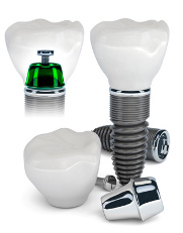
IMPLANTS FROM £360 – BOOK AN APPOINTMENT
Come and see us, to find the best treatment for your dental needs
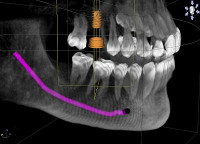
Can anyone get dental implants?
Yes, most adults can get dental implants. Apart from those who do not have enough bone in the jaw (after extraction) or those that suffer from a disease or take medication that make bone formation around the implant insufficient. However, each patient is different, so talk to your dentist about whether or not you are a good candidate for dental implants.

Who can not get dental Implants?
People who have received radiation therapy to the jaw are not considered as good candidates for dental implants. The below cases also may exclude you: immunotherapy, connective tissue disorders, bone infections, certain other infections, untreated diabetes, neglected oral hygiene.
Smoking is not a disqualifying circumstance, but my patients have to know that smoking lowers the probability of success. The identification and treatment of medical problems is indispensable to dental implantation. The examination may shed light on conditions that exclude the operation to get implants. While implantation carries a very little medical risks, certain chronic diseases, age-related conditions and life-style factors are considered prohibitive.
These conditions include:
- Serious immune system problems
- Serious diabetes (however, implantation is possible if the client’s levels are well controlled and closely monitored)
- Tumor diseases
- Serious cardiovascular diseases
- Seroius haematopoietic (blood-forming) diseases
- Seroius grave blood coagulation problems
- Seroius certain medications
- Pregnancy (because radiology is detrimental to the foetus)
- Insufficient bone quantity at the site of the operation
- Poor oral / dental hygiene level
- Young age, jaws still growing (age 14-18)
- Excessive alcohol consumption
- Any drug or medicine addiction
How does my dentist evaluate me for dental implants?
Your dentist or oral surgeon will review your medical and dental history and examine your mouth. X-rays or computed tomography (CT: www.ct-dent.co.uk) scans may reveal if bone grafts are necessary. Dental implants need to be embedded into enough bone to be successful,to be firm.
Hotel Dent will also examine your medical condition and current medications, in order to reveal and consider any possible risks of implantation. We have team of dentists, oral surgeons, and implantation specialists to assist Dr. Edit to provide you with the best and safest implant treatment possible.
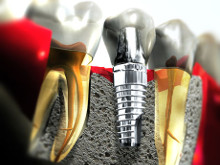
How much does dental implants cost?
The cost consists of three elements : The implant placement (surgery): this cost will vary by the region of the country, the competition to place implants in your area, whether the dentist placing the implant is a general periodontist, or surgeon, and the type of implant placed ( brand-name or generic; etc.) The abutment that gets screwed into implant: this will depend on what type of restoration is going on the implant and if the abutment comes with the implant, is a stock abutment or a custom abutment. The restoration: a PFM or Zirconium crown, partial denture, or full denture. This cost will depend on the region of the country, the competition in the area, the specialty level of the dentist, and the quality of the lab work.
Getting a dental implant
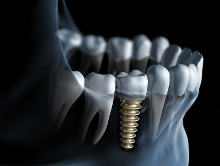
What is involved in getting a dental implant?
Three steps are usually included in getting a dental implant. Firstly, your dentist will surgically place the implant, -made of titanium- into the jaw where you have lost a tooth(planned by your CT-scan). Technically it is screw inserted into the jaw bone, and the gum is secured over the implant (fixed with stitches). You’ll have to leave this rest for three to five months, while the titanium implant actually fuses itself to your bone. You may be sore for a few days, so you’ll take painkillers, antibiotics if needed and will have to eat soft food. In the second step, your dentist will uncover the implant with the healing screw and attach an abutment to it. You’ll let this heal as well (1 day). In the third and final step, your dentist will make a crown that looks and feels like your own teeth, and attach it to your implant abutment. You now have a dental implant, which should last for decades.
Is a dental implant procedure painful?
In short, no. During the surgery the local anesthetics grant that you will not feel a thing. Once that effect fades, you may have some discomfort for 24-36 hours – painkillers will be provided if required. Most patients are back at work the next day, and are generally surprised by the ease of the procedure. If, however, you are having extensive bone grafting and sinus elevation surgery in preparation for your dental implants, you may not be permitted to drive for 24 hours and you may require pain medication.We know that each Patient’s reaction is different but from experience, most patients have little to no distress.
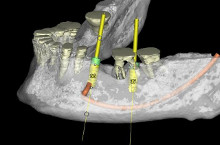
Is a CT Scan Necessary for Dental Implant Treatments?
In order to place an implant in the patient’s jaw, we need to assess several criteria at the location of the planned implant. Some of the important factors:
- Bone height
- Bone width
- Proximity to the nerves in the lower jaw
- Proximity of the sinus cavity in the upper jaw
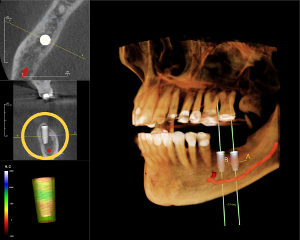
Using a 3D Cone Beam Scan (CT Scan) we can precisely analyze all of the above criteria and predetermine the exact size and location of the implant prior to the surgical placement. Here is a screen capture of the planning process for two implants to replace two missing molars in our actual patient’s lower jaw. The red line below the two planned implants is a nerve in the lower jaw. That nerve is often the limiting factor in the lower jaw where some implants for posterior teeth may be needed.
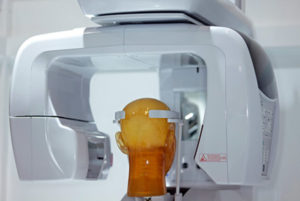
Proper use of technology helps ensure optimum results and safety of dental implant treatment.
Do dental implants look natural?
Dental implants are designed to blend in with your existing teeth. Many people believe that dental implants look and feel more natural than other methods for replacing missing teeth. Dentures, as opposed to implants, for example, can slip, or alter the way you speak, and make food chewing more difficult and uncomfortable. People who receive dental implants often say that they forget they have them in their mouths, have a look on our Patient’s photo after 9 Implants – Open Sinus Lift – Bone Graft and Membrane.
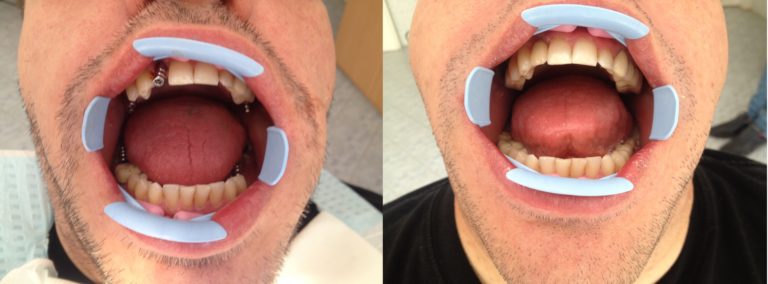
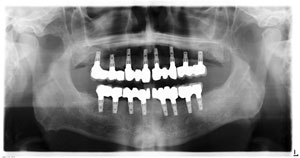
How many dental implants can be placed in my mouth?
Consultation with an x-ray and CT-scan will help to determine your potential for implants and the amount of implants required. The CT will show us how much bone is present in the locations where you will need implants placed.
In general, a dental implant can replace any extracted tooth in your mouth as long as the surgical area meets all requirements for the implant. Could be replaced one by one, or as an Implant Bridge. Bone thickness and healthy gums are major factors for site selection.
What implat brand can I choose from?
- Alpba Bio Implants
- Nobel Biocare Implants
Bone Graft, Membrane, Sinus Lift
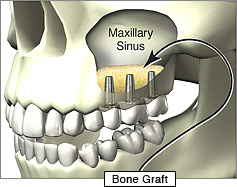
What are a sinus lift and bone graft?
Bone grafting can repair dental implant sites that have inadequate bone structure due to previous extractions, gum disease or injuries. Because the sinus cavity can be involved at the site of a dental implant in the posterior upper jaw, a special bone grafting procedure called a “sinus lift” is sometimes performed (open sinus lift or closed sinus lift).
This procedure consists of the dental implant surgeon entering the sinus and carefully lifting the sinus lining to create a space to accommodate the appropriate sized implant (usually few millimeters). A bone graft is inserted between the elevated sinus membrane and the floor of the sinus. Keep in mind that the floor of the sinus is the roof of the upper jaw. If enough bone between the upper jaw ridge and the bottom of the sinus is available to stabilize the implant well, sinus augmentations and implant placement can sometimes be performed as a single procedure.
If there isn’t enough bone tissue available, sinus augmentation will have to be performed first, then the graft will have to mature for several months, depending upon the type of graft material and the patients personal attributes.
(Alpha Bio Bone Grafting Material – Membrane)
Aftercare
What happens after I get dental implants?
After the last step of putting a crown onto your implant, you should be immediately ready to eat anything and begin smiling as much as you can. Brushing and flossing are still needed – even more than before, along with visiting your dentist every year for cleanings, and to make sure your implant is holding up as expected. Nothing can take the place of a healthy set of natural teeth.
But when an accident ends in tooth loss, it’s good to know that dental implants are one of the most effective ways to replace missing teeth. Dental implants help to preserve the bone after teeth are lost or extracted (in one seats or extraction before). With careful treatment planning and good oral health care and hygiene, dental implants can provide a healthy, and confident smile for a lifetime.
Do I need to have my implants checked and cleaned regularly?
Implants need to be cleansed just like your original teeth daily (Brushing and Flossing). This will help keep your dental implants clean and the surrounding bone and gum tissues healthy. Your dental implant dentist need to check up on the implant once a year. With good maintenance and routine dentist visits in Golders Green, there is no reason your implants would not last for a very long time, even a lifetime.
